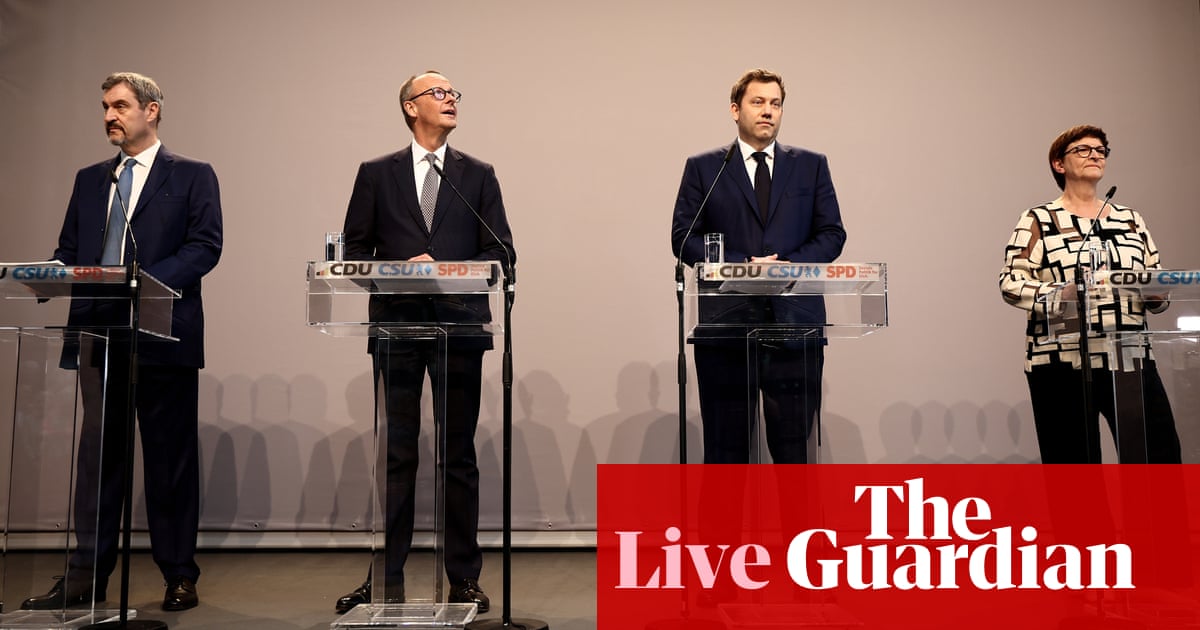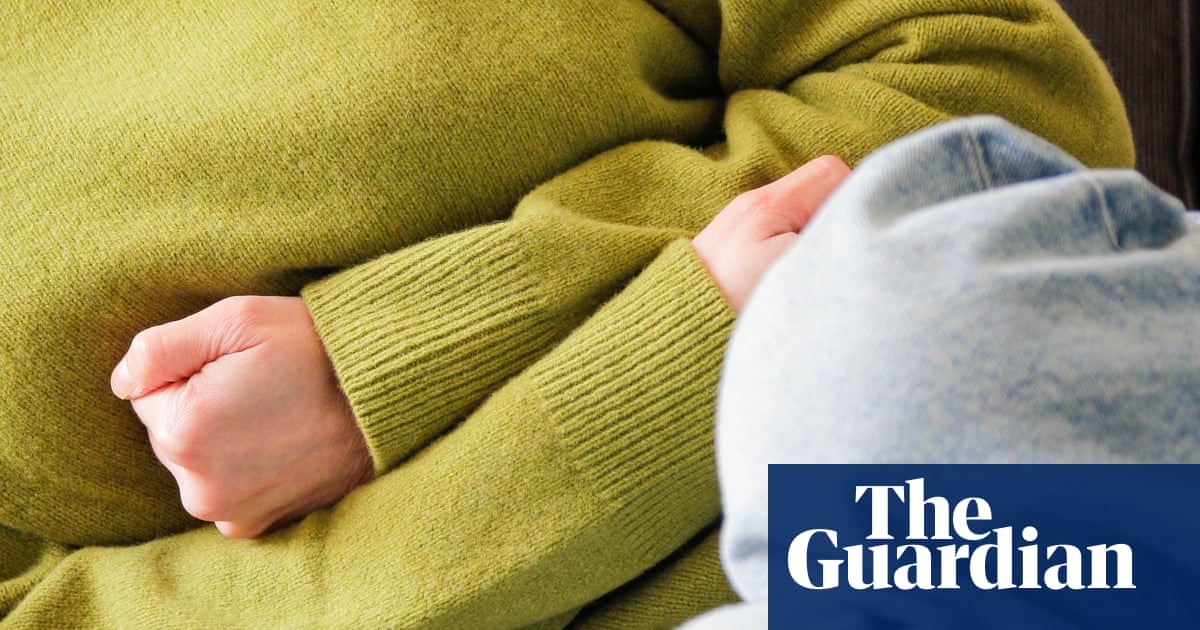Germany to send ‘clear signal’ of ‘strong, effective government’ under new coalition, Merz says
Opening the press conference in Berlin, Merz says the coalition has “a strong plan” as a result of negotiations, which will send “a clear signal” to both Germans and European partners that Germany is getting a “strong and effective government.”

Key events
-
Closing summary
-
Trade war ‘casts dark shadow over prospects’ of Irish economy, finance minister warns
-
EU reveals details of €20bn plan for AI development
-
Details on EU’s retaliatory tariffs in response to Trump’s tariffs
-
UK and Italy talk about clean energy on margins of King Charles’s visit
-
Peace is ‘never to be taken for granted,’ King Charles tells Italian parliament
-
Greeks protest to demand increased wages amid rising living costs
-
Opposition parties criticises Merz’s ‘ignorant’ plan and ‘act of surrender’
-
New German coalition to target issues that fuelled rise of far-right, Merz says – other quotes
-
Coalition agreement – other policies
-
‘Key message to Trump: Germany is back on track,’ Merz says
-
Coalition agreement – migration, national security
-
Merz suggests he could formally become chancellor in early May
-
Coalition agreement – preamble, foreign, defence policy
-
Investments, migration, security among early priorities, Merz says
-
Germany to send ‘clear signal’ of ‘strong, effective government’ under new coalition, Merz says
-
EU adopts trade countermeasures against US
-
German coalition press conference gets under way
-
King Charles to address Italian parliament soon
-
German coalition announcement expected shortly
-
Hungary to oppose EU retaliatory measures on US
-
China retaliates against US tariffs – business live
-
‘Half the place would be blown to bits’: the Irish villages under threat from Trump’s tariffs
-
EU pharmaceuticals warn of ‘risk of exodus’ as result of Trump’s threats on tariffs
-
Estonia signs into law rules banning non-EU citizens from local elections
-
German coalition deal reportedly agreed, with press conference this afternoon
-
UK to seek improved trade with EU in response to Trump’s tariffs, Russia’s war against Ukraine
-
Tariffs will hit working, middle classes hardest, Spain’s Sánchez warns
-
Italy halves 2025 growth forecast over tariff fears
-
AfD gains in polls as Germany faces dire economic news and political limbo – snap analysis
-
Far-right Alternative für Deutschland tops federal poll in Germany for first time
-
Romania ‘has not received any official information’ on US plans to withdraw troops, defence ministry says
-
Morning opening: Tariffs? Doing very well, thank you.
Closing summary

Jakub Krupa
… and on that note, it’s a wrap from me, Jakub Krupa, for today.
-
German conservatives announced a coalition deal with the centre-left Social Democrats promising to form a new “strong and effective” government, led by Friedrich Merz (15:16, 15:26, 15:33).
-
The 146-page manifesto agreed by the parties will offer the framework for the new government, expected to be in place in early May (16:00).
-
Merz promised the government will target issues that allowed for the rise of the far-right Alternative für Deutschland (16:53), which earlier today came top in the national voting intention poll for the first time in history (10:31 and 10:39).
-
The manifesto proposes tough reforms on migration and internal security to address voters’ concerns, (16:15), and reaffirms the government’s commitment to play an important role in Europe and transatlantic alliance in paragraphs on foreign policy and defence (15:54). But his proposals were criticised by the opposition parties (17:01).
-
Asked about his message for US president Donald Trump, Merz said that “Germany is back on track,” and promised it would play an important role in the European Union (16:18).
Elsewhere,
-
The EU has agreed to impose retaliatory tariffs on €21bn (£18bn) of US goods, targeting farm produce and products from Republican states, in Europe’s first act of retaliation against Donald Trump’s tariffs (15:11 and 17:23).
-
Separately, the EU has also revealed details of a €20bn (£17bn) plan to create new sites equipped with vast supercomputers in Europe to develop the next generation of artificial intelligence models, while opening the door to amending its landmark law that regulates the technology (17:26).
-
King Charles III has warned peace is “never to be taken for granted” during a historic address to Italy’s parliament (17:17), with senior officials talking about clean energy on the margins of his visit (17:18).
-
Tens of thousands of Greeks have staged protest rallies to demand increased wages amid rising living costs, hours after the country was paralysed by a 24-hour general strike (17:07).
-
Estonia’s president has signed into law a constitutional amendment banning non-EU citizens from taking part in local elections, a move targeting the large Russian minority in the Baltic state (13:01).
-
Romania said it “has not received any official information” on alleged plans to pull US troops out of central and eastern Europe after media reports suggesting such scenario (9:49).
And that’s all from me, Jakub Krupa, for today.
If you have any tips, comments or suggestions, email me at jakub.krupa@theguardian.com.
I am also on Bluesky at @jakubkrupa.bsky.social and on X at @jakubkrupa.
Trade war ‘casts dark shadow over prospects’ of Irish economy, finance minister warns

Lisa O’Carroll
And more on tariffs, Ireland’s finance minister has said that the commencing trade war between the US, the EU and the rest of the world “casts a dark shadow over prospects” of the Irish economy.
Paschal Donohoe said Trump’s latest threat to impose tariffs on pharmaceuticals would contribute to investor uncertainty generated by his other tariffs – on steel, on cars, on China and reciprocal tariffs on the EU.
“These moves are deeply regrettable. Tariffs are economically destructive for all involved – they trigger lose-lose outcomes,” he told the Dáil.
“Tariffs, and even the threat of tariffs, also create uncertainty which prompts businesses to hold back investment and households to increase precautionary saving,” he said.
“The current uncertainty means that tariffs were probably already having a detrimental impact on economic activity around the world, even before the latest announcements from the White House,” he said.
“It is no exaggeration to say that the world is changing,” he told the Irish parliament noting the US has now imposed tariffs on China totalling 104%, making the tax paid on imports higher than the value of the product itself.
EU reveals details of €20bn plan for AI development

Jennifer Rankin
Separately, the EU has also revealed details of a €20bn (£17bn) plan to create new sites equipped with vast supercomputers in Europe to develop the next generation of artificial intelligence models, while opening the door to amending its landmark law that regulates the technology.
Publishing a strategy to turn Europe into an “AI continent”, the European Commission vice-president Henna Virkkunen said the technology was at the heart of making Europe more competitive, secure and technologically sovereign, adding: “The global race for AI is far from over.”
The EU is attempting to catch up with the US and China, which have taken a lead in pioneering the technology that increasingly powers shopping websites and self-driving cars, generates text, and is predicted to play a transformative role in healthcare, security and defence, and advanced manufacturing, among other sectors.
In a separate 2024 report, Stanford found that no EU country made the top five for “vibrancy” in AI, a metric that considered private investment, patents and research. It ranked the UK in third place behind the US and China, with France in sixth place and Germany eighth.
Details on EU’s retaliatory tariffs in response to Trump’s tariffs

Jennifer Rankin
I earlier brought you the official confirmation of the EU’s retaliatory tariffs against the US on trade as a result of Donald Trump’s tariffs on steel and aluminium (15:11).
Here is a more complete write up by our Brussels correspondent, Jennifer Rankin:
The EU has agreed to impose retaliatory tariffs on €21bn (£18bn) of US goods, targeting farm produce and products from Republican states, in Europe’s first act of retaliation against Donald Trump’s tariffs.
The EU plans to introduce 25% tariffs on scores of goods from almonds to yachts, with the first duties being collected from 15 April, while the bulk apply from 15 May and the remainder from 1 December.
All member states voted for the retaliation, with the exception of Hungary, whose prime minister, Viktor Orbán, is one of Trump’s strongest supporters.
The EU decision came after China announced it was hitting all US goods with 84% tariffs from Thursday, up from the 34% previously announced.
The EU measures are a response to the US tariffs on steel and aluminium announced by the US president in February. The EU has chosen goods that can be easily sourced from elsewhere, while some targets are intended to inflict political pain on key Republican states.
The tariffs include US soya beans, grown abundantly in Louisiana, the home state of the House of Representatives speaker, Mike Johnson.
Ahead of the vote, analysis of the leaked list of customs codes by Politico found that EU duties would hit up to $13.5bn (£10.6bn) worth of exports from red states, including beef from Kansas and Nebraska, cigarettes from Florida and wood products from North Carolina, Georgia and Alabama.
The commission has said that the second phase of the EU’s response – retaliatory measures in response to tariffs on cars and the sweeping “reciprocal tariffs” announced on 2 April – would be presented “early next week”.
Full story:
UK and Italy talk about clean energy on margins of King Charles’s visit

Fiona Harvey
Also in Rome, David Lammy, the UK’s foreign secretary, met his counterpart, Italy’s foreign minister and deputy prime minister, Antonio Tajani, for talks on clean energy on Wednesday, including on the issue of “critical minerals”, which are essential to the manufacture of low-carbon goods, such as solar panels, wind turbines and electric vehicles.
The ministers agreed on the need to boost renewable energy around the world, in the midst of economic turmoil – forming a counterpoint to Donald Trump, who has issued fresh executive orders blocking climate policies by several states, and supporting coal.
It is often forgotten that Italy was the UK’s partner in hosting the Cop26 climate summit in 2021. That partnership was agreed in late 2019, months before the Covid-19 crisis overtook the world, which overshadowed the conference and made joint events more difficult in the run-up. But the countries have continued a dialogue since then, to push for greater adoption of low-carbon technologies and the creation of green jobs, which has continued despite the differences in outlook of their respective leaders.
King Charles, who is visiting Italy, and Italy’s president Sergio Mattarella were expected to drop in on the talks in the late afternoon. Later this month, the UK will also host a global conference in London, along with the International Energy Agency, to discuss energy security.
Lammy said:
“The UK and Italy are strengthening our partnership to unlock growth opportunities, create jobs and accelerate the global transition to clean, secure, affordable energy. The shift to clean energy is a global challenge that requires us all – governments, energy businesses and the financial sector – to work together.
Our talks in Rome are a key moment to unlock clean growth and build robust clean energy supply chains, including for critical minerals – for the benefit of us all.”
Tajani said:
“Energy is a key driver of growth for our businesses, our economies and our societies. Italy and the United Kingdom share common objectives with regard to the energy transition, which are also clearly outlined in our 2023 Memorandum of Understanding on Bilateral Cooperation: technological neutrality, achieving net zero emissions by 2050, phasing out coal for energy production and increasing the role of renewables and new technologies for the production of clean energy.
“We actively cooperated for the success of the Cop26 in Glasgow, launching a major project at the 2021 pre-CoP in Milan for the involvement of young people committed to the fight against climate change.
We also share the vision that inspired many initiatives promoted by Italy during its presidency of the G7, especially with regard to access to energy in Africa, where we are actively engaged also through the Mattei Plan.”
Peace is ‘never to be taken for granted,’ King Charles tells Italian parliament
King Charles III has warned peace is “never to be taken for granted” during a historic address to Italy’s parliament. He also paid tribute to the close ties between the two nations and said “Italy will always be in my heart”, PA news agency reported.
PA said that the king, who is making a four-day state visit to Italy with his wife, told the politicians in the Chamber of Deputies in Rome: “Britain and Italy stand today united in defence of the democratic values we share.”
He made history by becoming the first British monarch to address both houses of Italy’s parliament and, after mentioning the Second World War, said: “Today, sadly, the echoes of those times, which we fervently hope had been consigned to history, reverberate across our continent.
“Our younger generations can see in the news every day on their smartphones and tablets that peace is never to be taken for granted.”
PA noted that sections of the speech were delivered in Italian, and in a lighter moment the King referenced his wedding anniversary, telling the politicians from the chamber of deputies and the senate of the republic in their own language: “The timing is all the more special to us both since today also marks our 20th wedding anniversary.”
“And by the way, I hope I’m not ruining Dante’s language so much that I’m never invited to Italy again.”
He earlier also met with Italian prime minister Giorgia Meloni.
Greeks protest to demand increased wages amid rising living costs

Helena Smith
Tens of thousands of Greeks have staged protest rallies to demand increased wages amid rising living costs, hours after the country was paralysed by a 24-hour general strike.
The walk-out, part of an acceleration in industrial action by unions, brought much of the nation’s transport system to a standstill, disrupting Easter travel by grounding flights both in and out of Greece, keeping ferries docked at ports and bringing trains to a halt. Private and public sector unions, who called the walkout, said they were “striking for the obvious. Pay rises and collective labour contracts now.”
Mired in crisis for almost a decade, the debt-stricken country was forced to enact stringent austerity measures in exchange for €290bn in bailout loans from the EU and IMF with the cuts affecting households far and wide.
As a result Greece currently has one of the lowest minimum wage rates in terms of purchasing power in the European Union, with families struggling to make ends meet amid soaring food, power and housing costs.
“Young people, like me, are forced to work several jobs and still can’t make ends meet,” said Melina Dinopoulou Veliz, a 21-year-old dental technician, posing with her student friend Angeliki Pontiaki in front of the Greek parliament after joining the rally. “There are so few prospects for our generation which is why so many of us are forced to seek better lives abroad.”
The private sector union, GSEE, which represents more than two million workers, said living costs were such that “we’re buying fewer goods by 10 % compared to 2019.” The union is not only calling for collective work contracts and higher wages but the reinstatement of bonuses scrapped over the past decade including an annual “Christmas gift.”
In the backlash, the centre-right government, now in its sixth year in office, has increased the monthly minimum wage by a cumulative 35 % to 880 euros and vowed to raise it to 950 euros by 2027.
Greece has some of the highest telecommunication and energy costs in Europe and, say protestors who have this year taken to the streets en masse over a deadly train crash, some of the worst public services.
“There just seems to be so much injustice,” said Pontiaki, in her final year of a sociology degree at Athens’ Panteion university. “The government is very good at not listening to us, and very quick to put police on the street but it can’t deny us our right to protest, it can’t take that away.”

Jakub Krupa
Right, let’s take a quick look at events elsewhere now.
Opposition parties criticises Merz’s ‘ignorant’ plan and ‘act of surrender’
When it comes to reactions, AfD’s Alice Weidel said the programme was “an act of surrender” on Merz’s part alleging he gave in to SPD’s demands.
The Left’s co-leader Ines Schwerdtner said the manifesto was “ignorant” on the needs of the working class and did not address “the major challenges of our time,” such as social cohesion, rents and inflation.
The Greens’ co-leader Franziska Brantner said the document was disappointing.
New German coalition to target issues that fuelled rise of far-right, Merz says – other quotes
In other quotes from the press conference, Friedrich Merz also:
-
said the new coalition will target issues that allowed for the rise of the far-right Alternative für Deutschland, which earlier today came top in the national voting intention poll for the first time in history, as he said the AfD’s electoral result in February was a “wake-up call”;
-
called for a “common, European response” to US tariffs and trade rules adopted by China, but insisted that the best response would be to improve Germany’s competitiveness globally;
-
defended proposed cuts in civil service, saying the government will reduce the federal administration by 8%, but not through “hiring an Elon Musk here who is doing things like these in Washington,” but instead “doing it in a socially acceptable, sensible and measured way.”

Jakub Krupa
Did you spot anything else? Did I miss anything?
Let me know: jakub.krupa@theguardian.com or on social media (X, BlueSky).
Coalition agreement – other policies
Just a few more things from the German coalition programme that attracted my attention…
The programme lists a number of proposals on innovation, mobilisation of funds for investment through a new “Germany Fund”, and changes to financial regulations, including reforms to reduce capital requirements for infrastructure projects and ensure “faster and streamlined state aid procedures.”
The new coalition also promised extensive support for the country’s embattled automotive industry, with a series of proposals to promote electric mobility as part of a push to cleaner economy. Looking more into the future, it even includes lines on future mobility, automated driving and space exploration.
On trade, the document reiterates Germany’s support for “a pragmatic and rules-based trade policy,” promising a swift ratification of the EU’s agreements with Mercosur and Mexico.
In an apparent reference to Donald Trump’s actions, it says the coalition wants to avoid a trade conflict and will push for the reduction of tariffs.
In a defence of the German high street, it also pledges to “protect retailers from unfair competition” from “the Far East” – I think they mean China – with a push for European standards.
The manifesto also promises to reduce bureaucracy requirements for small and medium companies, and focus on “simpler” procurement and “faster” approvals.
There are also numerous proposed reforms of work and unemployment laws, including the push for a minimum wage of 15 euros in 2026 and to exempt overtime work from taxes.
It also contains provisions on pursuing the goal of climate neutrality by 2045, supporting “climate adaptation,” and a push to use more renewable sources of energy.
‘Key message to Trump: Germany is back on track,’ Merz says
Asked about his message for US president Donald Trump, Friedrich Merz says in English that “the key message … is: Germany is back on track.”
“Germany will fulfil its obligations in terms of defence, and Germany is willing to strengthen [our] own competitiveness.
And that is not just Germany; that is Europe, the European Union, and Germany will be again a very strong partner within the European Union, and we will bring the European Union forward.”
SPD’s Lars Klingbeil adds: “I fully agree.”
Coalition agreement – migration, national security
The manifesto also goes into some details on the highly contentious issue of national security and migration – which was at the centre of the clash between the two parties earlier this year, with CDU/CSU pushing for radical changes and winning a parliamentary vote with the support of the far-right AfD.
On migration, the document says that Germany “is and will remain” a cosmopolitan country, but needs to effectively combat irregular migration, with multiple changes to that effect.
It says the coalition will terminate voluntary federal admission programmes and not open new ones, and suspend family reunification scheme for people offered “subsidiary protection for a limited period of two years,” but not the most vulnerable groups.
The paper says the new government will keep controls on German borders, and work to tighten rules on asylum. The parties want to expand the list of safe countries of origin, and seek to fast-track removals of people who had their asylum application rejected or committed serious crimes.
It also includes a number of proposals on promoting integration, including support for legal migrants. As I reported earlier, it promises to abolish the “turbo naturalisation” route, closing the path to get the German passport after three years.
On national security, the document talks about introducing a three-month data retention requirement to help federal police’s investigations, as well as backs the use of AI-powered and automated data searches and biometric checks “for certain purposes” and, more broadly, automated license plate recognition technologies.
The programme also says about the need to strenghten the cooperation between existing security bodies, particularly to fight “cybercrime, espionage and sabotage.”
It also directly condemns “all forms of violence” and radicalisms – pointedly criticising right-wing extremism and Islamism – and promises to fight algorithms that promote radicalisation, including under the EU’s Digital Services Act.
Merz suggests he could formally become chancellor in early May
During the press conference, Merz gets asked about the timeline for the new government.
He says the final arrangements are down to the president of the Bundestag and the approval processes, particularly within the SPD, but the CDU will meet on 28 April, and the formal election of the chancellor could take place the following week, that is w/c 5 May.
He says there is no exact date in place yet – but clearly this answer suggests him getting into the office in early May.
Coalition agreement – preamble, foreign, defence policy
As the leaders speak, I’m flicking through the 146-page coalition agreement (in German, here).
In the preamble, the document focuses on the parties’ responsibility for “facing historic challenges,” as they warn against the enemies of liberal democracy and a range of threats against Germany.
Their central pledge is that “the parties of the democratic centre can shape the country together successfully.”
I will look at different parts of the programmes, but starting on national security and foreign policy, the document warns that Germany’s security is “under greater threat than at any time since the end of the cold war,” with Russia identified as the main threat.
It says that the coalition’s commitment to Nato and the EU “remains unwavering,” and the relationship with the US “remains of central importance.”
On the EU, it says the bloc “needs a strong Germany,” as it reaffirms its commitment to the process of European integration and hints at plans to seek closer relations with France and Poland.
It also calls for a more aggressive enforcement against countries failing to comply with the EU’s values and the rule of law.
The document says the coalition will “provide comprehensive support to Ukraine,” with readiness to provide further support to Kyiv. It reaffirms the long-term prospect of Nato membership for Ukraine.
The UK – “even after Brexit” – is also listed as “one of the closest partners,” with plans for a “comprehensive bilateral … agreement” in the future.
The deal also acknowledges the relationships with Israel, Turkey, among others, and offers broad support for the EU enlargement process looking at the countries in Western Balkans, Ukraine, and Moldova.
On China, it says it will seek cooperation “where this is in the German and European interest,” but also notes some of challenges and promises to “confront China where necessary.”
On defence, the document says it will want to “strengthen the operational readiness of the armed forces,” with more investment and through embracing “future technologies,” on top of commitments I covered earlier.










